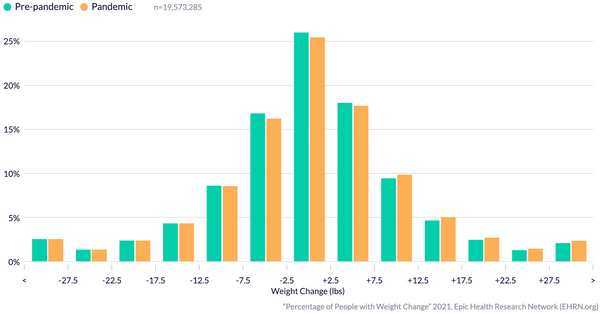A June 2023 Twitter thread from Democratic presidential primary challenger Robert F. Kennedy Jr. that began with a video of him performing pushups also stated an allegedly science-based fact — that the average American gained 29 pounds during the lockdowns of the early COVID-19 pandemic. There are several ways in which this statement is false.

First, Kennedy misrepresented the findings of the survey he cited. Second, that survey — even when read correctly — does not properly address the question Kennedy claimed it addresses. And third, published clinical data suggest the pandemic did not have a significant overall effect on weight and, instead, followed a trend of an increase in the average weight of Americans that has existed since well before the pandemic.
In an email to Snopes, Kennedy conceded that this critique was valid. "I appreciate you catching my mistake and alerting me," he wrote.
Kennedy Misrepresented Findings of APA Survey
The statistic Kennedy (partially) quoted comes from a 2021 survey conducted by the American Psychological Association. That study found that 42% of people gained unwanted weight during the pandemic, and within that subset of people the average weight gain was 29 pounds.
APA's survey of U.S. adults, conducted in late February 2021 by The Harris Poll, shows that a majority of adults (61%) experienced undesired weight changes—weight gain or loss—since the pandemic started, with 42% reporting they gained more weight than they intended. Of those, they gained an average of 29 pounds (the median amount gained was 15 pounds) and 10% said they gained more than 50 pounds, the poll found.
When the pool of individuals you are looking at includes only people who reported gaining weight (and not, for example, the people who say they lost or maintained weight during the same period of time) the number is going to be significantly higher. Kennedy's claim relies on the notion that the only Americans that existed during the pandemic are those who gained weight. This same survey indicated that "18% of U.S. adults report undesired weight loss, with an average weight loss of 26 lbs."
In response to our question about his use of this data, Kennedy responded to Snopes by email stating that he was in error. "I made an error in describing 29 lbs as a national average," he wrote.
APA Survey Is Inappropriate for Conclusion Kennedy Drew
The APA survey did not gather weight data on any individual. Instead these data stem from surveys carried out by the APA, Stress In America, that measure "attitudes and perceptions of stress among the general public". This particular survey, the Pandemic Anniversary Survey, was conducted roughly a year into the pandemic in February 2021. It had a sample size of just over 3,000 individuals:
The Pandemic Anniversary Survey was conducted online within the United States by The Harris Poll on behalf of the American Psychological Association between Feb. 19 and 24, 2021, among 3,013 adults age 18+ who reside in the U.S.
The survey questions were designed to identify perceptions of stress, not to quantify standardized measurements of weight. Reports of undesired weight gain, in this sort of study, are entirely self-reported. Even if used in good faith, such a survey would not be an appropriate gauge of actual trends of weight gain or loss in America.
Clinical Data Suggest Pandemic Had Little Overall Effect on Weight
In contrast to the APA study and its 3,000 participants, a research paper published by the Epic Health Research Network (EHRN) analyzed anonymized medical data collected from nearly 20 million patients across America at multiple times before, at the onset of, and during the pandemic, as explained in the July 2021 publication:
These data come from Cosmos, a HIPAA Limited Data Set of more than 111 million patients. [...] Data are pooled from 128 healthcare organizations representing 640 hospitals that span 49 states and cover 19,573,285 patients. This includes 15,663,833 patients in the year prior to the pandemic and 14,922,615 patients over the course of the pandemic.
Cosmos, its website says, is the "largest integrated database of clinical information in the United States." Composed of anonymized clinical records, the dataset is a product of a software company that manages medical records in many American hospitals. Epic Research is an arm of this collection of companies publishing papers based on their Cosmos dataset.
In the study, the researchers found that an almost equal number of individuals gained weight as lost weight during the pandemic:
We evaluated weight change for adults during the pandemic compared to weight change for adults in the year prior to the pandemic. A weight loss or gain of 2.5 pounds, which we define as a normal fluctuation or "no change," was most common, both pre-pandemic and during the pandemic. Nearly as many patients lost weight (35%) as gained weight (39%) during the pandemic.
By utilizing data from before the pandemic, from the start of the pandemic, and from during the pandemic, the researchers were also able to compare rates of weight gain or loss year by year. As described in the study, the period of time from the onset of the pandemic into May 2021 brought slightly higher average body weight than the preceding time period, but this was in line with a national trend of increasing average weight:
The average adult weight over time has increased, as shown in Figure 3 [below]. The slight increase in the average adult weight during the pandemic period of less than one pound is consistent with the previous trend. Weight change patterns were similar regardless of age and sex.
Their findings also put the extremity of Kennedy's claim in perspective. The clinical data indicates that only about 2% of individuals gained more than 27.5 pounds during the early pandemic:

Because no study actually says that the average American gained 29 pounds during the early pandemic, because the study used to reach that conclusion — even if interpreted correctly — is ill-suited for the purpose Kennedy used it, and because nationwide clinical data suggest otherwise, the claim is False.


